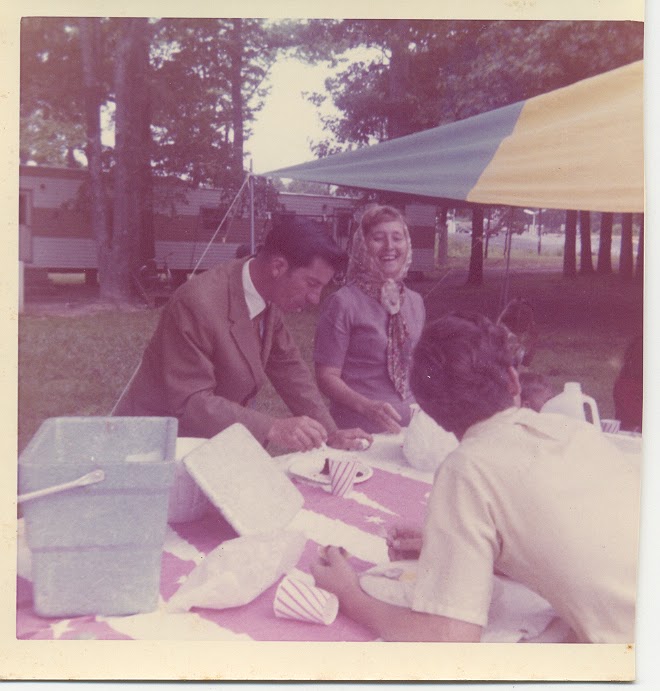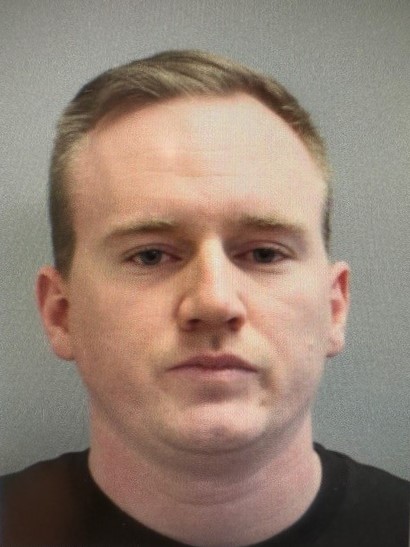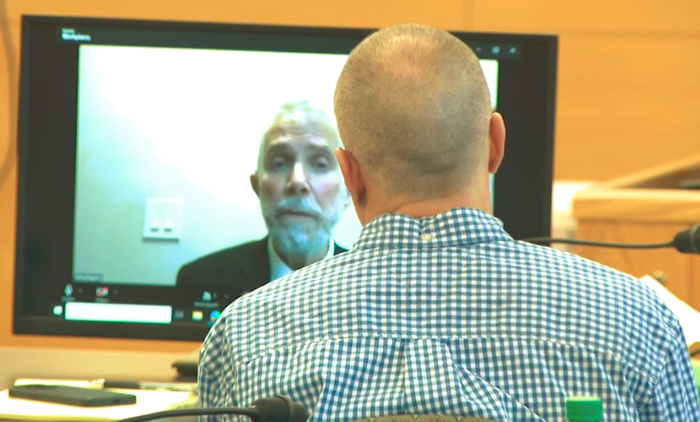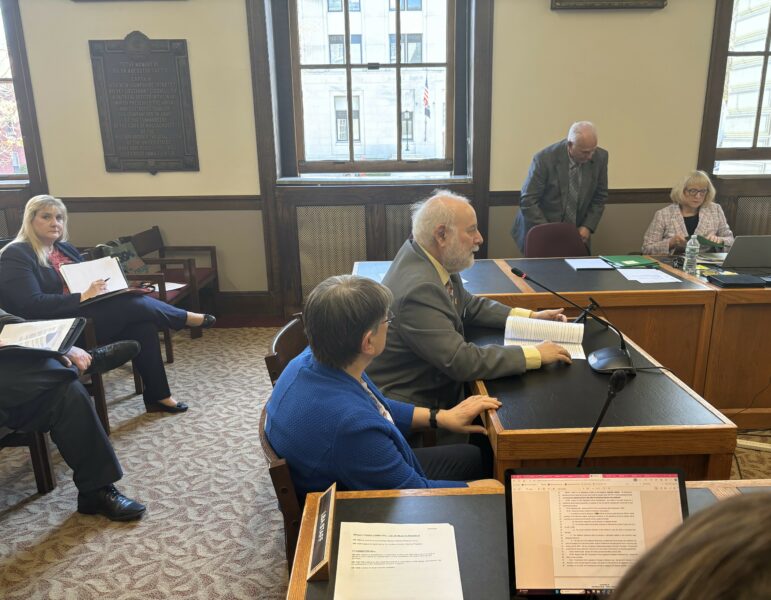By Carolyn Hutton,
Dappled Things: How To Live in the In Between
When I was a little girl, at the start of the school year, we always brought home the dreaded form for free lunch. Now let me say right off that I am so thankful for free lunch programs—in fact I believe all school lunches should be free—and if my own children were still small and I needed resources I would absolutely sign up and be proud of figuring out this way to feed my children.
But in the late 60s, having free lunch at Denton Elementary School meant that a couple of minutes before the children lined up to go to the cafeteria with their small red tokens in hand, the stern gray haired school secretary stepped briskly into the classroom and called out loudly “free lunch tokens, line up here!” And while the class watched, silently, she placed a green token in every little hand. I used to watch this happen with a feeling of dread in my stomach; I used to tell myself that if Daddy signed us up for free lunches I would starve before I would take a green token.
He never did. We could have used free lunches. We didn’t have much money. It’s not that my parents refused help—although when I think about it, they often did—but they were proud and they were children of the Depression, when you just learned to “make do.”
They certainly did that. My mother could sew anything. She took apart her sister’s discarded skirts and turned them into dresses for my sister Ruth and me. We lived for the first part of my life on my Grandpa Loflin’s farm. That was a saving grace for my family, having that place to live with milk cows and oak trees and the sun coming up every morning behind the barn.
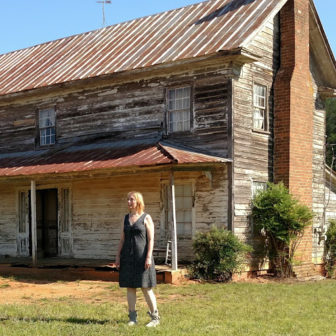
Carolyn Hutton is pictured at a home near where she grew up in North Carolina.
But in return for the free rent, Daddy kept that place spotless—not a weed stuck up after he mowed the vast yard. He painted the white walls and repaired the tin roof and the leaning chimney; he and Mama pruned the grapevine and apple trees and trimmed the rose bushes. They grew a garden and Daddy shot deer and squirrels and trapped rabbits and in a way, except for feeling the fear about the lunch tokens, I never felt poor.
But that was about something more than pride. It was an attitude about what you do with money, even if you don’t have much. My parents gave money away. What do I remember about Mama and Daddy when I think about those times? They talked a lot about people going through hard times.
When I was a little older, Mama started working across the road at Surratts Hosiery Mill. Times were a little easier then. Mama was good at any work, efficient, and she was able to “make production” which meant she got paid as high as she could be for the number of socks she paired or folded.
How many times do I remember she sat at the dining room table with Daddy with the checkbook, paying the bills, and she would say, “You know, so- and so-s having a real hard time this week. Her husband’s out of of work and I believe she needs a little encouragement.” To Mama, “a little encouragement” meant she would put a 20 dollar bill in an envelope with a card and lay it somebody’s work table, often unsigned.
To Daddy, “a little encouragement” meant he pretty much gave away cars for free. Now Daddy probably should have been a teacher. He was not a salesman. My mother’s brothers were all salesmen, all starting out with nothing and making their fortunes in the mobile home industry. But Daddy loved cars. He loved going to used car auctions to buy them.
How many sultry hot rainy North Carolina nights can I remember at car auctions; the roar of old engines, the cry of the auctioneer on a sputtering microphone, the smell of exhaust and wet asphalt, the sight of bleached blonde women in tight white pants and heavy blue eyelids (I watched them working the crowd and I wanted to be them, a little bit); A young hired boy would zoom a car into position in the auction lane, men in cheap black vinyl jackets would open the hoods of cars and slam them shut again, shaking their heads knowingly.
Daddy would often buy an old car, holding up a fistful of 20 dollar bills, then he’d take it home and fine tune the engine and wax it lovingly until it shone; Mama would scrub the inside and deodorize it with baking soda to try to get the cigarette smell out, we kids had to wash the tires and buff the hood all the time looking for treasures somebody left behind, a quarter, a little doll one time. And then Daddy would put a hand-lettered for sale sign on it and tell Mama he was going to do good on this one.
And then a man just out of jail would come by with his wife and five little children and he didn’t have the money for a down payment. But Daddy would look at him and look through his beat up car window at his young wife and the children piled on top of each other and looking hungry, and he’d write out a Bill of Sale for I don’t know how little. That’s how we lived.
But you know, it wasn’t a bad way to live. I think sometimes about “want.” So much of the time we are afraid of losing something, so we hold on tight. We hold on to our money, our time, our lovers, our children, our lives. We can’t unclench our hands because we are afraid of losing what we have.
Or, and this is true for so many of us, we keep ourselves tightly shut because we don’t think we have anything to give. We thought we had something to offer—but then we lost the job or the husband left or we didn’t make the audition or we got sick and disabled—and instead of feeling that we have value we feel worth-less. Nobody wants want we have, who we are.
So for all of us, those of us terrified of having nothing and those of us terrified at being nothing—the story of my mama and daddy bears thinking about maybe. There is not one of us who is so poor, in body or in spirit, that we don’t have something—money, time, music, a kind word, mercy, a vote—that somebody else needs.
I want to end this blog with an ancient story—Threaded through every age and culture is a story about the miracle of giving something away and maybe we can think about why this might be so. This one, once again, is from the Old Testament—King James Version because I love that language, but of course this can be translated to any version:
And it came to pass after a while, that the brook dried up, because there had been no rain in the land.
8 And the word of the Lord came unto [the prophet Elijah], saying,
9 Arise, get thee to Zarephath, which belongeth to Zidon, and dwell there: behold, I have commanded a widow woman there to sustain thee.
10 So he arose and went to Zarephath. And when he came to the gate of the city, behold, the widow woman was there gathering of sticks: and he called to her, and said, Fetch me, I pray thee, a little water in a vessel, that I may drink.
11 And as she was going to fetch it, he called to her, and said, Bring me, I pray thee, a morsel of bread in thine hand.
12 And she said, As the Lord thy God liveth, I have not a cake, but an handful of meal in a barrel, and a little oil in a cruse: and, behold, I am gathering two sticks, that I may go in and dress it for me and my son, that we may eat it, and die.
13 And Elijah said unto her, Fear not; go and do as thou hast said: but make me thereof a little cake first, and bring it unto me, and after make for thee and for thy son.
14 For thus saith the Lord God of Israel, The barrel of meal shall not waste, neither shall the cruse of oil fail, until the day that theLord sendeth rain upon the earth.
15 And she went and did according to the saying of Elijah: and she, and he, and her house, did eat many days.
16 And the barrel of meal wasted not, neither did the cruse of oil fail, according to the word of the Lord, which he spake by Elijah.
(I Kings ch 17 King James Version)
I suppose all of these Old Testament stories are about waiting, about daring to trust the Universe with everything we have. Is there risk in giving up the last thing you think you have? Is there risk in giving what you don’t think you have to give? Yes, of course. Is it worth it?
I think that’s what we have these old stories for, so we can ponder them and come to some light of truth for ourselves.
Caroyln Hutton is an English teacher. When she was in 5th grade, she read “Harriet the Spy” and loved Harriet so much that she started keeping a notebook that got her into as much trouble as it got Harriet in because she always told the truth in her notebooks. But she never stopped writing. A native of North Carolina, Carolyn is also a musician and plays bluegrass and old time music with Drowned Valley and the duo Long Journey. She lives with her husband, Rod, in Madbury where their four grown children sometimes visit.
